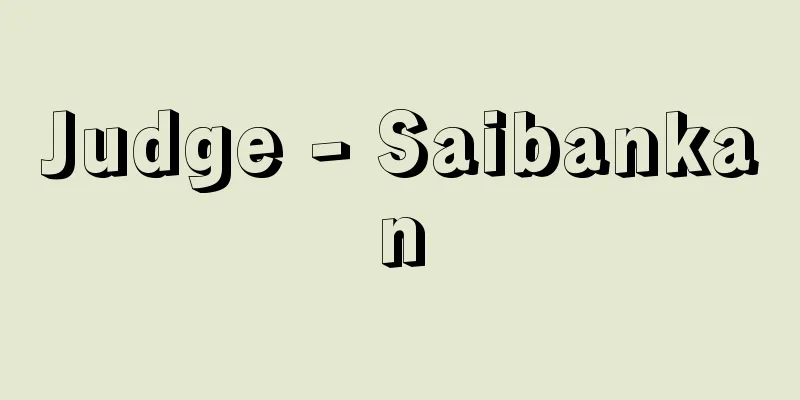Judge - Saibankan

|
It refers to the civil servants among the court officials who constitute the institution that exercises judicial and administrative powers of justice. In the UK, judges are expected to be fair, compassionate, honorable, and steadfast in their decisions, and the same is probably true in Japan. [Ichiro Uchida] kindsJudges are classified as Chief Justice of the Supreme Court, Supreme Court justices, Chief Justices of High Courts, judges, assistant judges, and summary court judges (Article 5 of the Court Act). [Ichiro Uchida] Qualifications for AppointmentSupreme Court judges are appointed from among persons aged 40 or over who have a high level of knowledge and legal literacy. At least 10 of them must have held one or more of the following positions for 10 years or more: Chief Justice of a High Court or judge, or have held one or more of the following positions for a total of 20 years or more: Chief Justice of a High Court, judge, summary court judge, public prosecutor, lawyer, or professor or associate professor of law at a university separately specified by law (Article 41 of the Court Act). Chief Justices and judges of High Courts are appointed from among persons who have held one or more of the following positions for a total of 10 years or more: assistant judges, summary court judges, public prosecutors, lawyers, court research officers, instructors at the Legal Training and Research Institute or the Training and Research Institute for Court Officials, or professor or associate professor of law at a university separately specified by law (Article 42 of the Court Act). Assistant judges are appointed from among those who have completed their legal apprenticeship training (Article 43 of the Court Act). Summary court judges are appointed from among certain qualified candidates, but they are also selected and appointed (Articles 44 and 45 of the same Act). [Ichiro Uchida] Appointment and assignmentWith regard to grounds for disqualification for appointment, in addition to those who cannot be appointed as general civil servants under laws other than the Court Act, those who have been sentenced to imprisonment or more, and those who have been subject to a trial for dismissal by an impeachment court, cannot be appointed as judges (Court Act, Article 46). The Chief Justice of the Supreme Court is appointed by the Emperor upon the designation of the Cabinet (Constitution, Article 6, Paragraph 2; Court Act, Article 39, Paragraph 1). Supreme Court justices are appointed by the Cabinet (Constitution, Article 79, Paragraph 1; Court Act, Article 39, Paragraph 2). The appointment and dismissal of Supreme Court justices is certified by the Emperor (Court Act, Article 39, Paragraph 3). The Chief Justice of the High Court, judges, assistant judges, and summary court judges are appointed by the Cabinet from a list of persons nominated by the Supreme Court (Constitution, Article 80, Paragraph 1, first part; Court Act, Article 40, Paragraph 1). The appointment and dismissal of the Chief Justice of the High Court is certified by the Emperor (Court Act, Article 40, Paragraph 2). The term of office of lower court judges shall expire 10 years after their appointment and they may be reappointed (Court Act, Article 40, Paragraph 3). Regarding appointments, the Supreme Court will appoint judges to the posts of lower court judges (Article 47 of the same law). For example, a judge appointed as Judge A to the Tokyo District Court. [Ichiro Uchida] Independence of the judgesAll judges shall exercise their authority independently, according to their conscience, and shall be bound only by the Constitution and the law (Article 76, paragraph 3 of the Constitution). Case law has determined that a judge's obedience to his or her conscience means that the judge follows his or her own inner good sense and moral values, without succumbing to external pressure or temptation, whether tangible or intangible. The independence of judges is the foundation of the independence of judicial power, which was essentially established in the Otsu case of 1891 (Meiji 24). Furthermore, the supervisory power of the judicial administration shall not affect or restrict the judicial power of judges (Article 81 of the Court Act). [Ichiro Uchida] Job securityA judge may not be removed from office except by public impeachment, unless a court has determined that he or she is unable to perform his or her duties due to mental or physical incapacity. Disciplinary action against a judge may not be taken by an administrative organ (Article 78 of the Constitution). All Supreme Court judges receive an appropriate amount of remuneration at regular intervals. This remuneration may not be reduced during their term of office (Article 79, Paragraph 6 of the Constitution). All lower court judges receive an appropriate amount of remuneration at regular intervals. This remuneration may not be reduced during their term of office (Article 80, Paragraph 2 of the Constitution). A judge may not be dismissed, transferred, transferred to another post, suspended from his or her duties, or have his or her remuneration reduced against his or her will, except in cases of public impeachment or law relating to public review, or in cases where a judge has been adjudged unable to perform his or her duties due to mental or physical incapacity as provided for by other law (Article 48 of the Court Act). [Ichiro Uchida] National referendumThe appointment of Supreme Court justices shall be subject to a national referendum at the first general election for the House of Representatives held after their appointment, and shall be subject to further review at the first general election for the House of Representatives held ten years after that, and so on thereafter. In such cases, any justice in which the number of votes in favor of removal exceeds the number of votes against removal shall be removed. Matters relating to the review shall be determined by law (Article 79, Clauses 2-4 of the Constitution). This is the Law Concerning National Referendum on Supreme Court Justices. [Ichiro Uchida] Impeachment of a judgeThe Diet shall establish an impeachment court composed of members of both Houses to try judges who have been charged with impeachment. Matters relating to impeachment shall be determined by law (Article 64 of the Constitution). This is the Judges' Impeachment Law. A judge may be removed from office through impeachment if (1) he or she has seriously violated the duties of his or her official position or grossly neglected his or her duties, or (2) he or she has committed other misconduct, whether in or outside of official position, that seriously undermines the prestige of the judge (Judges' Impeachment Law, Article 2). Trials shall be decided by the majority opinion of the jurors involved in the hearing. However, in order to hold a trial for removal from office, a majority opinion of at least two-thirds of the jurors involved in the hearing must be reached (Article 31, Paragraph 2 of the same Law). A judge shall be removed from office by the pronouncement of a trial for removal from office (Article 37 of the same Law). [Ichiro Uchida] Judge's DisciplineIf a judge violates the duties of his/her job, neglects his/her duties, or behaves in a manner that is disrespectful of his/her dignity, he/she will be disciplined by a court as provided for by a separate law (Article 49 of the Court Act). This is the Judges' Disciplinary Law. Disciplinary action against a judge shall be a reprimand or a fine of up to 10,000 yen (Article 2 of the Judges' Disciplinary Law). [Ichiro Uchida] Retirement ageSupreme Court judges retire when they reach the legally prescribed age (Article 79, Paragraph 5 of the Constitution). Lower court judges retire when they reach the legally prescribed age (Article 80, Paragraph 1, proviso to the Constitution). In other words, Supreme Court judges retire when they reach 70 years of age, High Court, District Court and Family Court judges retire when they reach 65 years of age, and Summary Court judges retire when they reach 70 years of age (Court Act, Article 50). [Ichiro Uchida] Prohibition of political activities by judgesA judge may not engage in the following acts while in office (Court Act, Article 52): (1) Becoming a member of the National Diet or a local government assembly, or actively engaging in political activities [Ichiro Uchida] Disqualification, challenge, and avoidance of judgesArticle 37, paragraph 1 of the Constitution guarantees the accused the right to a fair trial. Therefore, there are certain circumstances in which a judge may lose the qualifications to actually perform his/her duties in a particular case. These are disqualification, recusal, and avoidance (Civil Procedure Code, Articles 23-26; Criminal Procedure Code, Articles 20-25; Criminal Procedure Rules, Articles 9-14). [Ichiro Uchida] Lay judge systemIn Japan's judicial system, professional judges, legal experts, have been the main players. In the past, the jury system was implemented from 1928 to 1943, but it did not take root. In response to this, the Council for Judicial System Reform in 2001 proposed a new system of public participation in criminal proceedings, and based on this, the Law on Criminal Trials with Lay Judges (Law No. 63 of 2004) was enacted in 2004 and came into effect in 2009. The lay judge system was introduced because lay judges selected from among the public would participate in criminal proceedings together with judges, which would contribute to increasing public understanding of and confidence in the judiciary (Law on Criminal Trials with Lay Judges, Article 1). Lay judges are to exercise their authority independently (Article 8 of the same law), and lay judges are to play a part in the independence of judicial power. There are also provisions requiring lay judges to perform their duties impartially and sincerely (Article 9 of the same law). Jurors are provided with travel expenses, daily allowances and accommodation costs (Article 11 of the same law). [Moriichi Taguchi] [References] | | | | | | |Lay | | | | | Research Institute|Bar exam| | | | |Source: Shogakukan Encyclopedia Nipponica About Encyclopedia Nipponica Information | Legend |
|
裁判所職員のうち裁判権および司法行政権を実行する機関を構成する公務員をいう。イギリスでは裁判官judgeの資質として、公平であること、哀れみ深いこと、高潔であること、決心を曲げないことが要請されているが、日本でも同様であろう。 [内田一郎] 種類裁判官には最高裁判所長官、最高裁判所判事、高等裁判所長官、判事、判事補、および簡易裁判所判事の別がある(裁判所法5条)。 [内田一郎] 任命資格最高裁判所の裁判官は、識見の高い、法律の素養のある年齢40年以上の者のなかからこれを任命する。そのうち少なくとも10人は、10年以上高等裁判所長官および判事の職の一つもしくは二つにあった者、または高等裁判所長官、判事、簡易裁判所判事、検察官、弁護士、別に法律で定める大学の法律学の教授または准教授の職の一つもしくは二つ以上にあってその年数を通算して20年以上になる者などの資格を要する(裁判所法41条)。高等裁判所長官および判事は、判事補、簡易裁判所判事、検察官、弁護士、裁判所調査官、司法研修所教官または裁判所職員総合研修所教官、別に法律で定める大学の法律学の教授または准教授の職の一つまたは二つ以上にあってその年数を通算して10年以上になる者などのうちからこれを任命する(同法42条)。判事補は、司法修習生の修習を終えた者のなかからこれを任命する(同法43条)。簡易裁判所判事は、一定の有資格者のなかからこれを任命するほか、選考任命も行われる(同法44条、45条)。 [内田一郎] 任命・補職任命の欠格事由については、裁判所法以外の法律の定めるところにより一般の官吏に任命されることができない者のほか、禁錮以上の刑に処せられた者、弾劾裁判所の罷免の裁判を受けた者の一つに該当する者は、これを裁判官に任命することができない(裁判所法46条)。 裁判官の任命は、最高裁判所長官については、内閣の指名に基づいて、天皇がこれを任命する(憲法6条2項、裁判所法39条1項)。最高裁判所判事は、内閣でこれを任命する(憲法79条1項、裁判所法39条2項)。最高裁判所判事の任免は、天皇がこれを認証する(裁判所法39条3項)。高等裁判所長官、判事、判事補、簡易裁判所判事は、最高裁判所の指名した者の名簿によって、内閣でこれを任命する(憲法80条1項前段、裁判所法40条1項)。高等裁判所長官の任免は、天皇がこれを認証する(裁判所法40条2項)。下級裁判所の裁判官は、その官に任命された日から10年を経過したときは、その任期を終えるものとし、再任されることができる(同法40条3項)。 補職については、下級裁判所の裁判官の職は、最高裁判所がこれを補する(同法47条)。たとえば、甲判事を東京地方裁判所判事に補するというようなのがこれである。 [内田一郎] 裁判官の独立すべて裁判官は、その良心に従い独立してその職権を行い、憲法および法律にのみ拘束される(憲法76条3項)。判例は、裁判官が良心に従うというのは、裁判官が有形無形の外部の圧迫ないし誘惑に屈しないで自己の内心の良識と道徳観に従うという意味であるとしている。裁判官の独立は、司法権の独立の根幹をなすものであり、司法権の独立は、1891年(明治24)の大津事件で実質的に確立された。また司法行政の監督権は、裁判官の裁判権に影響を及ぼし、またはこれを制限することはない(裁判所法81条)。 [内田一郎] 身分保障裁判官は、裁判により、心身の故障のために職務をとることができないと決定された場合を除いては、公の弾劾によらなければ罷免されない。裁判官の懲戒処分は、行政機関がこれを行うことができない(憲法78条)。最高裁判所の裁判官は、すべて定期に相当額の報酬を受ける。この報酬は、在任中、これを減額することができない(憲法79条6項)。下級裁判所の裁判官は、すべて定期に相当額の報酬を受ける。この報酬は、在任中、これを減額することができない(憲法80条2項)。裁判官は、公の弾劾または国民の審査に関する法律による場合、および別に法律で定めるところにより心身の故障のため職務をとることができないと裁判された場合を除いては、その意思に反して、免官、転官、転所、職務の停止または報酬の減額をされることはない(裁判所法48条)。 [内田一郎] 国民審査最高裁判所の裁判官の任命は、その任命後初めて行われる衆議院議員総選挙の際、国民審査に付し、その後10年を経過したのち初めて行われる衆議院議員総選挙の際さらに審査に付し、その後も同様とする。この場合において、罷免を可とする投票が可としない投票より多い裁判官は罷免される。審査に関する事項は法律でこれを定める(憲法79条2項~4項)。最高裁判所裁判官国民審査法がこれである。 [内田一郎] 裁判官の弾劾国会は、罷免の訴追を受けた裁判官を裁判するため、両議院の議員で組織する弾劾裁判所を設ける。弾劾に関する事項は法律でこれを定める(憲法64条)。裁判官弾劾法がこれである。弾劾により裁判官を罷免するのは、(1)職務上の義務に著しく違反し、または職務を甚だしく怠ったとき、(2)その他職務の内外を問わず、裁判官としての威信を著しく失うべき非行があったとき、である(裁判官弾劾法2条)。裁判は、審理に関与した裁判員の過半数の意見による。ただし、罷免の裁判をするには、審理に関与した裁判員の3分の2以上の多数の意見による(同法31条2項)。裁判官は、罷免の裁判の宣告により罷免される(同法37条)。 [内田一郎] 裁判官の懲戒裁判官は、職務上の義務に違反し、もしくは職務を怠り、または品位を辱める行状があったときは、別に法律で定めるところにより裁判によって懲戒される(裁判所法49条)。裁判官分限法がこれである。裁判官の懲戒は、戒告または1万円以下の過料とする(裁判官分限法2条)。 [内田一郎] 定年最高裁判所の裁判官は、法律の定める年齢に達したときに退官する(憲法79条5項)。下級裁判所の裁判官は、法律の定める年齢に達したときには退官する(憲法80条1項但書)。すなわち、最高裁判所の裁判官は年齢70年、高等裁判所、地方裁判所または家庭裁判所の裁判官は年齢65年、簡易裁判所の裁判官は年齢70年に達したときに退官する(裁判所法50条)。 [内田一郎] 裁判官の政治運動等の禁止裁判官は、在任中、次の行為をすることができない(裁判所法52条)。 (1)国会もしくは地方公共団体の議会の議員となり、または積極的に政治運動をすること [内田一郎] 裁判官の除斥・忌避・回避憲法第37条第1項は、被告人に公平な裁判所の裁判を受ける権利を保障する。そこで、裁判官が特定の事件につき現実にその職務を行う資格を一定の事由により喪失する場合がある。除斥、忌避、回避がこれである(民事訴訟法23条~26条、刑事訴訟法20条~25条、刑事訴訟規則9条~14条)。 [内田一郎] 裁判員制度日本の裁判官制度では、もっぱら職業裁判官という法律専門家がその職を担ってきた。過去には、1928年(昭和3)から1943年まで陪審制度が実施されたことがあったが、定着するに至らなかった。これに対して、2001年(平成13)の司法制度改革審議会意見書が、刑事訴訟手続への国民の新たな参加制度を提言し、これに基づいて2004年に裁判員の参加する刑事裁判に関する法律(平成16年法律第63号)が成立し、2009年より実施された。裁判員制度は、国民のなかから選任された裁判員が、裁判官とともに刑事訴訟手続に関与することが、司法に対する国民の理解の増進とその信頼の向上に資することから導入された(裁判員の参加する刑事裁判に関する法律1条)。裁判員は、独立してその職権を行うとされ(同法8条)、裁判員も司法権の独立の一翼を担うこととされている。裁判員は、公平誠実にその職務を行わなければならない等の義務規定が設けられている(同法9条)。裁判員には、旅費、日当および宿泊費が支給される(同法11条)。 [田口守一] [参照項目] | | | | | | | | | | | | | | | | | |出典 小学館 日本大百科全書(ニッポニカ)日本大百科全書(ニッポニカ)について 情報 | 凡例 |
<<: Judges' Conference - Saibankankaigi
Recommend
Shukushin - guardian deity
One of the objects of magical worship. Shukushin i...
Eibetsu - Eibetsu
〘noun〙① A separation in which one will never see e...
Jibutsu-do (Buddha Hall)
〘 noun 〙 A hall or room where one places one's...
Salah al-Din al-Biṭār (English spelling)
… [Kimura Yoshihiro]. … From Michelle Aflak …He s...
ayre
…A form of vocal music that is relatively small a...
Ointment - Kouyakuneri
The title of a Kyogen piece. Miscellaneous Kyogen...
《Uttararamacarita》(English spelling)
…His representative work, Mālatīmādhava, consists...
Itabuna (English spelling)
A city in the southeastern part of Bahia State, on...
Brunhilde (English spelling)
550-613 She was the wife of Sigibert, King of Aust...
The Times Literary Supplement
A British literary weekly magazine, commonly known...
Stone Tower Yorifusa - Ishido Yorifusa
Date of birth and death unknown. Military command...
Autumn Palace - Akinomiya
In China, the Empress's palace Changqiu Palace...
Upper Volta
…the former name of Burkina Faso, a landlocked co...
Cicca
…In China and Japan, candles are made from the Ch...
Ensi (English spelling)
A title given to rulers in the Sumerian city-state...









